Market Overview
The Global Health Intelligent Virtual Assistant Market is predicted to be valued at USD 2,160.8 million in 2025 and is expected to grow to USD 52,735.5 million by 2034, registering a compound annual growth rate (CAGR) of 42.6% from 2025 to 2034.
A Health Intelligent Virtual Assistant (Health IVA) is an AI-powered digital tool designed to support healthcare providers, patients, and organizations by automating tasks, offering real-time assistance, and enhancing patient engagement. These assistants use natural language processing (NLP), machine learning, and voice recognition to provide personalized health information, appointment scheduling, medication reminders, symptom checking, and more.
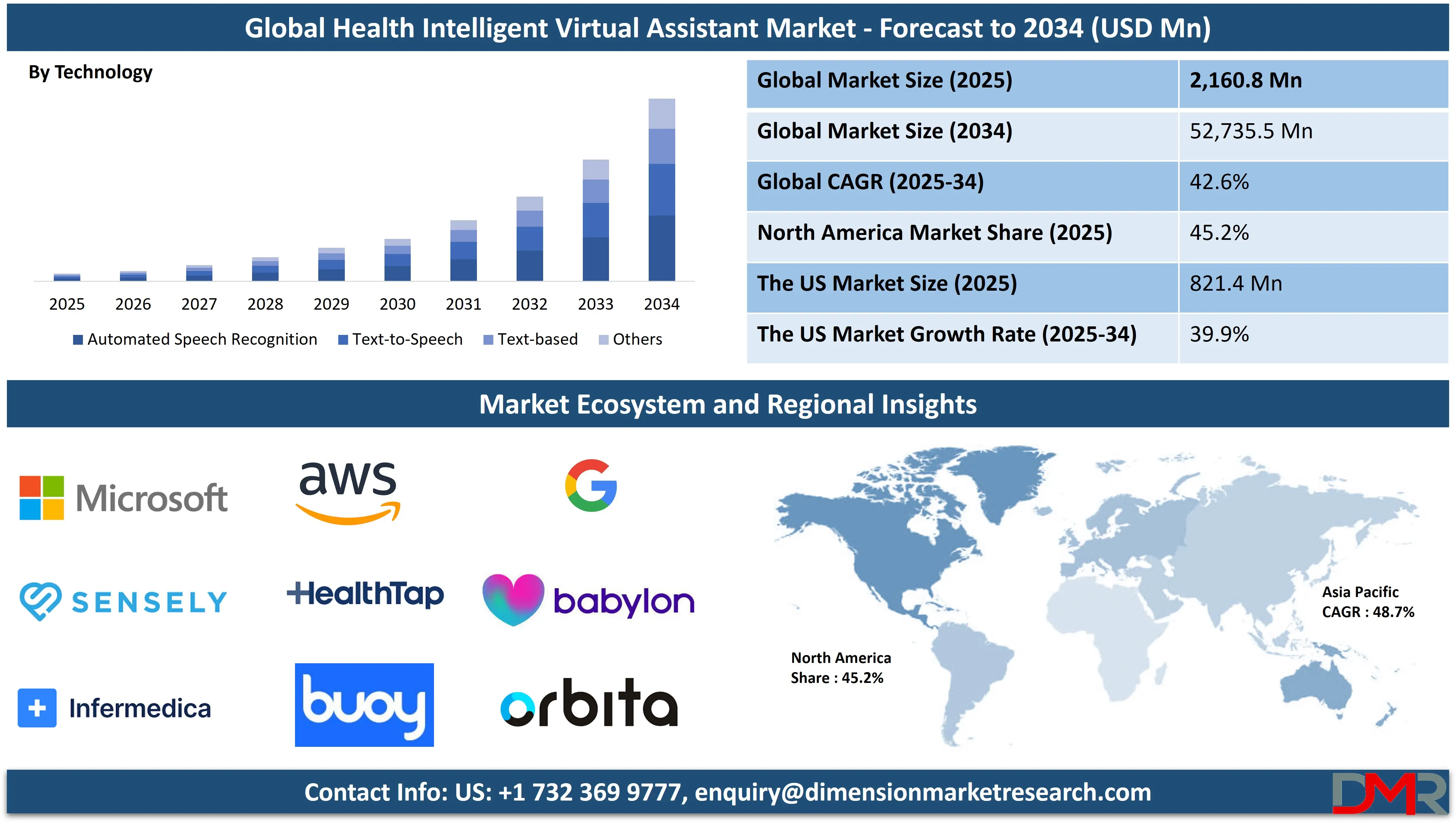
Deployed via mobile apps, chatbots, or smart speakers, Health IVAs improve healthcare access, streamline administrative processes, and reduce clinical workload. They also support chronic disease management and telehealth services, enabling efficient, round-the-clock care while enhancing patient satisfaction and adherence to treatment protocols.
The global flexible substrates market is experiencing substantial growth, driven by the increasing demand for lightweight, durable, and versatile materials across a broad spectrum of industries. These substrates, which serve as foundational layers in flexible electronics and advanced printed circuit boards, are gaining traction due to their ability to bend, fold, and conform to various shapes without compromising functionality. As industries move towards compact, portable, and energy-efficient devices, the need for high-performance flexible materials is surging.
The electronics industry is a major end user, with flexible displays, wearable devices, and flexible solar panels representing key application areas. Flexible substrates are increasingly utilized in the production of OLED displays, e-paper, RFID tags, and thin-film photovoltaic cells.
Their use in medical devices and sensors is also rising, especially as the healthcare sector embraces miniaturized and wearable technologies. Materials like polyimide, polyethylene terephthalate (PET), and polyethylene naphthalate (PEN) are among the most commonly used due to their thermal stability, chemical resistance, and mechanical strength.
In addition, the renewable energy sector is leveraging flexible substrates for thin-film solar cells, enhancing energy conversion and deployment on curved or irregular surfaces. The growing popularity of flexible printed electronics is another key driver, enabling the development of innovative applications in consumer electronics, automotive displays, and smart packaging.
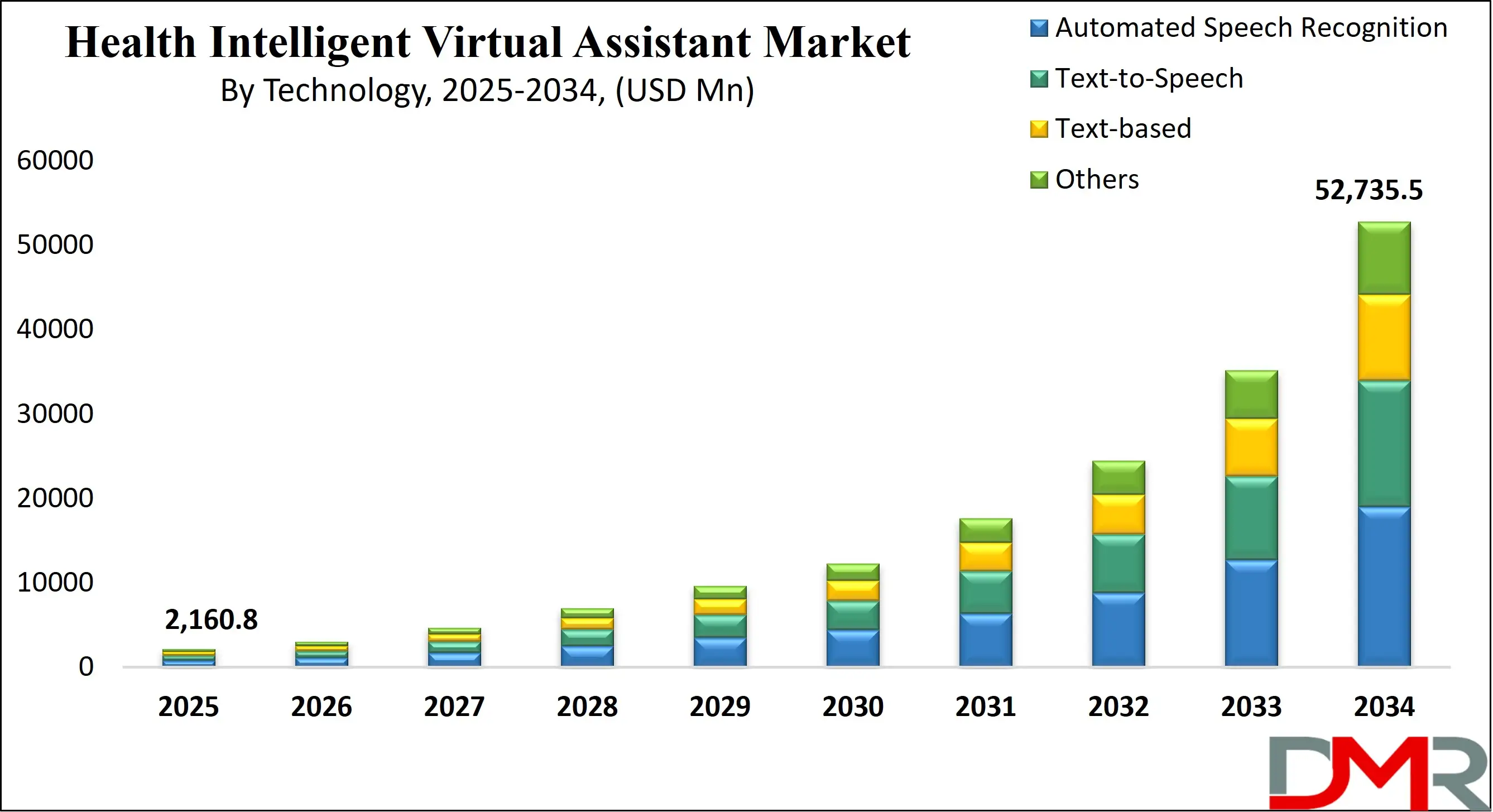
Technological advancements, combined with the push for sustainable and cost-effective solutions, are encouraging investments in research and development. As a result, the flexible substrates market is expected to witness diversification in materials, improved performance characteristics, and broader adoption across emerging industries.
The US Health Intelligent Virtual Assistant Market
The US Health Intelligent Virtual Assistant Market is projected to be valued at USD 821.4 million in 2025. It is expected to witness subsequent growth in the upcoming period as it holds USD 16,818.1 million in 2034 at a CAGR of 39.9%.
The US Health Intelligent Virtual Assistant (Health IVA) market is driven by increasing demand for personalized healthcare services, rising adoption of AI in clinical settings, and growing pressure to reduce administrative burdens on healthcare professionals. Enhanced patient engagement through voice-enabled systems and chatbots is also a key factor.
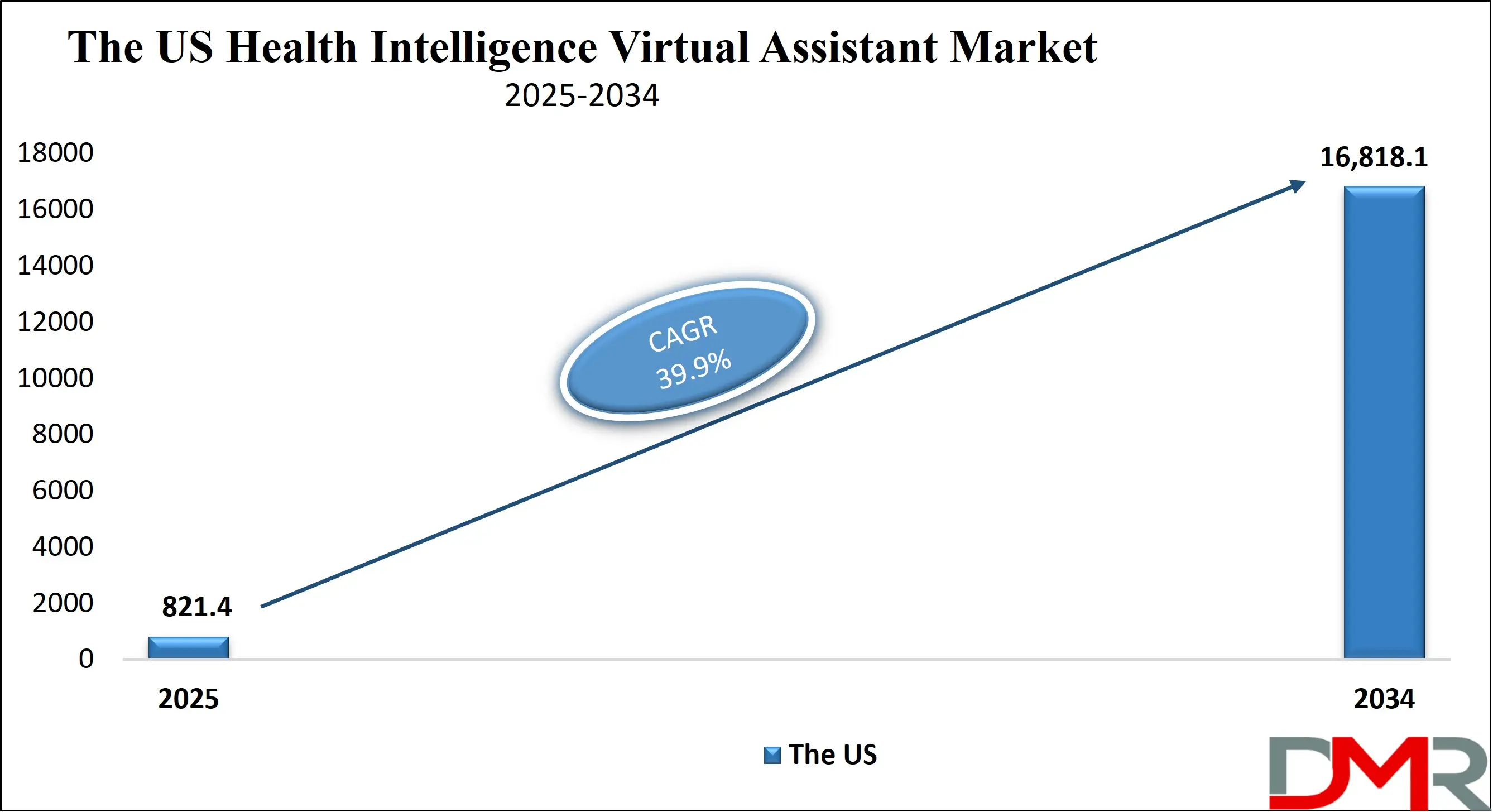
Government initiatives supporting digital health transformation, combined with widespread smartphone and smart speaker usage, further propel the market. Additionally, the need for efficient management of chronic diseases and the aging population fosters the adoption of Health IVAs for continuous monitoring, appointment scheduling, and medication reminders, enhancing overall healthcare delivery efficiency.
A major trend in the US Health IVA market is the integration of advanced NLP and machine learning for more human-like interactions. There's an increasing deployment of IVA platforms in telemedicine, supporting remote consultations and post-discharge follow-ups. Healthcare providers are focusing on omnichannel virtual assistants accessible via mobile apps, smart speakers, and hospital kiosks.
Another trend is the rise of HIPAA-compliant solutions to ensure secure patient data handling. Additionally, partnerships between tech companies and healthcare organizations are enhancing the capabilities of Health IVAs in areas like triage, mental health support, and patient education through intelligent conversational interfaces.
The Japan Health Intelligent Virtual Assistant Market
The Japan Health Intelligent Virtual Assistant Market is projected to be valued at USD 132.1 million in 2025. It is expected to witness subsequent growth in the upcoming period as it holds USD 3,682.4 million in 2034 at a CAGR of 44.8%.
Japan’s rapid aging population and pressure on healthcare resources are key driving forces behind the adoption of Health Intelligent Virtual Assistants. IVAs are seen as practical tools for supporting elderly patients in managing medications, understanding health conditions, and maintaining regular communication with healthcare professionals.
The government’s focus on healthcare automation and AI innovation further encourages hospitals and clinics to implement IVAs as part of smart hospital infrastructure. Additionally, Japan’s strong technology ecosystem and consumer familiarity with virtual agents foster rapid integration of IVAs in both urban and rural healthcare settings.
In Japan, Health IVAs are evolving to address culturally specific communication styles, ensuring more empathetic and respectful interactions. Voice-enabled assistants are being integrated into home care devices and smart wellness gadgets to assist the elderly population. Hospitals are leveraging IVAs for bilingual support to aid medical tourism and international patient care. There's a growing trend of IVA integration with robotic platforms in elder care facilities, enabling hybrid support systems. Moreover, initiatives promoting digital health literacy are contributing to the broader public acceptance and effective use of IVA technology.
The Europe Health Intelligent Virtual Assistant Market
The Europe Health Intelligent Virtual Assistant Market is projected to be valued at USD 614.3 million in 2025. It is expected to witness subsequent growth in the upcoming period as it holds USD 14,898.7 million in 2034 at a CAGR of 41.6%.
Europe’s Health IVA market is driven by strong policy frameworks promoting eHealth and digital transformation in healthcare systems. The need for reducing administrative overheads, improving accessibility in remote regions, and enhancing patient engagement is pushing adoption of AI-powered virtual assistants. Rising chronic disease prevalence and an aging population are further fueling demand for automated, yet human-like, support systems. Investments in healthcare innovation and increasing awareness among patients about digital tools are enabling hospitals and clinics to integrate IVAs into existing electronic health records and teleconsultation workflows.
In Europe, multilingual IVAs are being developed to cater to diverse populations across different countries and regions. Natural language processing tailored for local dialects and medical terminologies is gaining focus. Data privacy and GDPR compliance are shaping IVA design and deployment, encouraging localized data processing and secure integration methods. Health IVAs are also being used in public health campaigns, vaccine scheduling, and chronic care programs. The trend of cross-border telemedicine is promoting interoperable IVA platforms that seamlessly function within different national health systems.
Health Intelligent Virtual Assistant Market: Key Takeaways
- Market Overview: The global Health Intelligent Virtual Assistant market is projected to reach a valuation of USD 2,160.8 million in 2025 and is anticipated to grow significantly, hitting USD 52,735.5 million by 2034. This reflects a robust compound annual growth rate (CAGR) of 42.6% during the forecast period from 2025 to 2034.
- By Product Analysis: Chatbots are expected to lead the global Health Intelligent Virtual Assistant market by the end of 2025, contributing approximately 63.4% to the overall market share.
- By Technology Analysis: Automated Speech Recognition (ASR) is predicted to dominate the market in 2025, accounting for around 45.8% of the total share.
- By End User Analysis: Healthcare providers are set to be the primary end users of Health Intelligent Virtual Assistants by 2025, holding an estimated 57.6% share of the global market.
- Region with the Largest Share: North America is forecasted to be the leading region in the global Health Intelligent Virtual Assistant market, capturing about 45.2% of total revenue by the close of 2025.
Health Intelligent Virtual Assistant Market: Use Cases
- Appointment Scheduling: Health IVAs enable patients to schedule, reschedule, or cancel medical appointments through voice or text. This automation reduces administrative workload, enhances convenience for patients, and minimizes no-shows by sending timely reminders and confirmations.
- Symptom Checking: Health IVAs guide users through symptom-checking by asking relevant questions and providing probable conditions or recommending care. These tools improve early detection, empower patient decision-making, and reduce unnecessary emergency room visits.
- Medication Reminders: Health IVAs help patients adhere to their treatment plans by sending personalized medication reminders. They can notify users of dosage times, track intake, and alert caregivers if doses are missed, thus improving medication compliance and health outcomes.
- Chronic Disease Management: For conditions like diabetes or hypertension, IVAs monitor patient inputs, provide lifestyle tips, and prompt regular check-ins. They support personalized care, reduce complications, and encourage long-term self-management through consistent interaction and data tracking.
- Mental Health Support: Health IVAs offer preliminary mental health support through mood tracking, cognitive behavioral prompts, and emotional check-ins. They provide users with a judgment-free, 24/7 accessible platform to manage stress, anxiety, or depression, supplementing professional care.
Health Intelligent Virtual Assistant Market: Stats & Facts
- MIT Technology Review reported that AI virtual assistants in healthcare have been shown to reduce clinical workload by up to 20% through automated patient engagement and documentation.
- Harvard Business Review highlights that health IVAs can reduce administrative costs, which account for over 25% of U.S. hospital expenditures, by automating tasks like appointment scheduling and insurance verification.
- Mayo Clinic stated that virtual assistants such as chatbots helped handle over 20,000 COVID-19 screening interactions per day during the pandemic, demonstrating scalability under stress.
- Journal of Medical Internet Research (JMIR) found that patient satisfaction rates with conversational AI in healthcare reached above 80% when used for triage or symptom checking.
- Nature Digital Medicine published that using health IVAs improved diagnosis accuracy in primary care by 10–15%, particularly in early triage scenarios.
- Stanford Medicine cited that more than 40% of healthcare providers in the U.S. now use some form of digital assistant or voice tech in clinical documentation.
- The Lancet Digital Health revealed that AI-powered virtual health assistants reduced average physician documentation time by up to 50%, freeing more time for patient interaction.
- CDC (Centers for Disease Control and Prevention) data indicated that voice assistants were used by over 60% of adults aged 18–34 in the U.S. to search for health-related information during 2023.
- Johns Hopkins University research showed that AI health chatbots can triage patients with comparable accuracy to junior doctors in controlled environments.
- The World Health Organization (WHO) acknowledged digital health assistants as a key enabler in achieving Universal Health Coverage (UHC) in underserved regions through remote and multilingual services.
- World Economic Forum stated that healthcare chatbots handled over 1 million queries globally in 2023, primarily related to symptoms, medications, and appointment scheduling.
- Harvard Medical School found that chatbots could reduce patient wait times by up to 60% by automating triage and FAQs in outpatient settings.
- Stanford Healthcare implemented AI chatbots that reduced call center volumes by 30% within the first 6 months of deployment.
- Journal of Medical Internet Research (JMIR) reported that 74% of users found health chatbots helpful for mental health support, with increasing engagement during off-hours.
- University of California, San Francisco (UCSF) noted that chatbot-powered follow-ups resulted in 20% higher patient adherence to post-operative care instructions.
- Mayo Clinic collaborated with Amazon Alexa to provide trusted health information and saw over 100,000 health-related queries monthly through smart speaker interactions.
- Journal of the American Medical Association (JAMA) found that smart speakers successfully answered 81% of medication-related queries correctly when connected to verified medical sources.
- Cedars-Sinai Medical Center deployed voice assistants in patient rooms, leading to a 35% reduction in nurse call button usage, improving staff efficiency.
- Microsoft Research highlighted that smart speakers equipped with AI can monitor patient breathing and detect abnormalities with over 85% accuracy using ambient sound.
- Duke University Health System reported that elderly patients using voice-enabled assistants for medication reminders experienced a 28% improvement in compliance compared to traditional methods.
Health Intelligent Virtual Assistant Market: Market Dynamics
Driving Factors in the Health Intelligent Virtual Assistant Market
Rising Demand for Virtual Healthcare Assistance
The growing need for real-time patient support and continuous health monitoring is driving the adoption of Health Intelligent Virtual Assistant (IVA) solutions. These AI-powered tools streamline healthcare workflows by automating appointment scheduling, medication reminders, and symptom assessment.
The integration of natural language processing (NLP) and machine learning (ML) enables virtual health assistants to deliver personalized, empathetic responses that enhance patient engagement. Additionally, increased smartphone and wearable usage is expanding access to digital healthcare assistants, particularly for chronic disease management and elderly care. The shift toward value-based care is encouraging hospitals and clinics to invest in health IVAs to reduce administrative burdens and improve patient satisfaction across digital health platforms.
Integration with Electronic Health Records
The seamless integration of intelligent virtual assistants with electronic health record systems is a significant driver of market growth. Health IVAs improve data accessibility and clinical decision-making by providing physicians with immediate access to patient histories, lab results, and treatment plans. These AI-powered assistants also help automate documentation, enabling healthcare professionals to spend more time on patient care and less on paperwork.
Enhanced interoperability and real-time data sharing across telemedicine platforms further drive the demand for IVA solutions. With increasing government support for digital health infrastructure, the adoption of intelligent healthcare assistants embedded in EHR systems is expected to accelerate across hospitals and primary care centers.
Restraints in the Health Intelligent Virtual Assistant Market
Data Privacy and Security Concerns
Despite the benefits of Health Intelligent Virtual Assistants, data privacy and cybersecurity remain major restraints. These AI health assistants handle sensitive patient information, including personal health data and medical records. A breach in security could lead to identity theft, non-compliance with regulations like HIPAA, and loss of patient trust.
As digital health tools expand, ensuring end-to-end encryption, secure data storage, and compliance with regional data protection laws becomes increasingly complex. Healthcare providers may hesitate to adopt virtual assistants due to potential legal liabilities and reputational risks associated with data mishandling. Therefore, robust cybersecurity frameworks are essential for broader IVA adoption in healthcare systems.
Limited Accuracy in Complex Clinical Interactions
While Health IVAs are proficient in routine queries, they often fall short in handling complex clinical interactions or interpreting nuanced patient symptoms. Limitations in natural language understanding, emotional intelligence, and contextual reasoning reduce the efficacy of these digital health assistants in critical care environments. Miscommunication or incorrect information from an AI health assistant can lead to poor patient outcomes, undermining trust in the technology.
In addition, diverse language preferences, medical terminologies, and dialects present barriers to effective deployment across global markets. As a result, healthcare providers may still prefer human-led consultations for high-risk or complex diagnostic processes.
Opportunities in the Health Intelligent Virtual Assistant Market
Expansion of Telehealth and Remote Care Services
The growing adoption of telemedicine platforms creates a significant opportunity for Health Intelligent Virtual Assistant market players. As patients increasingly opt for remote consultations and virtual care models, IVA systems can enhance service delivery by automating triage, symptom checking, and post-consultation follow-ups.
These AI-based virtual assistants improve the scalability and efficiency of digital healthcare ecosystems, especially in rural and underserved regions. With rising internet penetration and mobile device access, intelligent health assistants can bridge gaps in primary care and mental health support. Their ability to deliver 24/7 patient engagement also makes them attractive tools for healthcare startups and remote monitoring providers.
Advancements in AI and Natural Language Processing
Ongoing advancements in artificial intelligence, particularly in natural language processing (NLP) and machine learning, offer lucrative opportunities for Health IVA development. Enhanced algorithms enable these AI healthcare assistants to better understand, analyze, and respond to complex medical queries in multiple languages.
The integration of generative AI and voice recognition technologies is further enhancing the conversational experience, making digital health assistants more human-like and empathetic. These improvements are expanding the scope of IVA applications across mental health, chronic disease management, and personalized wellness coaching. Startups and tech giants are investing in innovation to launch intelligent health chatbots and smart speakers with clinical-grade capabilities.
Trends in the Health Intelligent Virtual Assistant Market
Rise of Multimodal Health IVA Solutions
A major trend in the Health Intelligent Virtual Assistant market is the emergence of multimodal interfaces, combining voice, text, and visual interactions. These hybrid AI healthcare assistant platforms enable more comprehensive patient support by offering visual explanations, speech-enabled navigation, and chatbot communication in a single interface.
Such multimodal virtual assistants improve accessibility for patients with different needs, including the elderly and those with disabilities. Integration with medical imaging tools and wearable devices also enables real-time health monitoring and interactive consultations. This trend reflects the broader movement toward personalized, patient-centric care in digital health environments.
Growing Use in Mental Health and Wellness Applications
Health Intelligent Virtual Assistants are increasingly being adopted for mental health support, therapy guidance, and emotional well-being programs. With rising awareness around mental health issues, AI-powered virtual assistants are being deployed as initial touchpoints for stress management, anxiety reduction, and behavioral therapy.
These digital assistants use sentiment analysis and conversational AI to deliver non-judgmental, round-the-clock support, often integrated into wellness apps and telepsychology platforms. The demand for scalable, stigma-free mental health solutions is fueling the development of emotionally intelligent healthcare assistants that can personalize interventions and escalate cases to professionals when needed.
Health Intelligent Virtual Assistant Market: Research Scope and Analysis
By Product Analysis
Chatbots are projected to dominate the global Health Intelligent Virtual Assistant market by the end of 2025, accounting for 63.4% of the total market share. These AI-powered virtual agents are increasingly utilized by healthcare organizations for patient triage, symptom checking, appointment scheduling, and chronic disease monitoring.
Their ability to operate 24/7, reduce administrative burden, and enhance patient experience has led to widespread adoption in telehealth platforms and digital front doors. The integration of natural language understanding and machine learning algorithms further boosts their efficiency in personalized interactions. As healthcare digitization accelerates globally, chatbot-based intelligent assistants are set to remain at the forefront of virtual care delivery.
Smart Speakers are anticipated to grow at the highest CAGR in the Health Intelligent Virtual Assistant market by the end of 2025. These voice-enabled devices are being increasingly incorporated into home-based healthcare environments, particularly for elderly care and remote patient monitoring.
Equipped with voice-command capabilities, they provide medication reminders, health tips, and connect users directly to telehealth providers. The rise in ambient assisted living, along with growing consumer familiarity with smart home ecosystems, is boosting their appeal. Their role in facilitating hands-free health management and real-time health data communication positions them as a rapidly expanding product category within virtual health interfaces.
By Technology Analysis
Automated Speech Recognition (ASR) is expected to dominate the Health Intelligent Virtual Assistant market by 2025, with a market share of 45.8%. ASR enables real-time conversion of spoken language into text, streamlining clinical documentation, voice-based queries, and EHR data entry. Its use in reducing physician burnout and improving accuracy in clinical workflows is a major driver.
The technology also supports multilingual voice interfaces, enhancing accessibility in diverse populations. ASR plays a pivotal role in virtual scribe solutions and voice-command healthcare assistants, which are increasingly used in hospitals and outpatient settings. As voice technology matures, ASR will remain a cornerstone in voice-enabled healthcare systems.
Text-to-Speech (TTS) technology is predicted to experience the highest CAGR by 2025. This technology is vital for improving healthcare accessibility, especially for visually impaired or elderly patients who may struggle with reading digital content. TTS transforms medical instructions, reminders, and health alerts into spoken output, enhancing patient comprehension and adherence.
It is also gaining traction in automated patient engagement systems and virtual nursing assistants, delivering dynamic, natural-sounding responses. The growing adoption of assistive technologies in both clinical and homecare settings, combined with AI advancements in voice synthesis, is accelerating demand for TTS across the healthcare sector.
By End User Analysis
Healthcare providers are expected to lead the global Health Intelligent Virtual Assistant market by 2025, capturing 57.6% of the total share. Hospitals, clinics, and specialty care centers are actively deploying intelligent virtual assistants to streamline clinical workflow automation, pre-visit screenings, and virtual consultations.
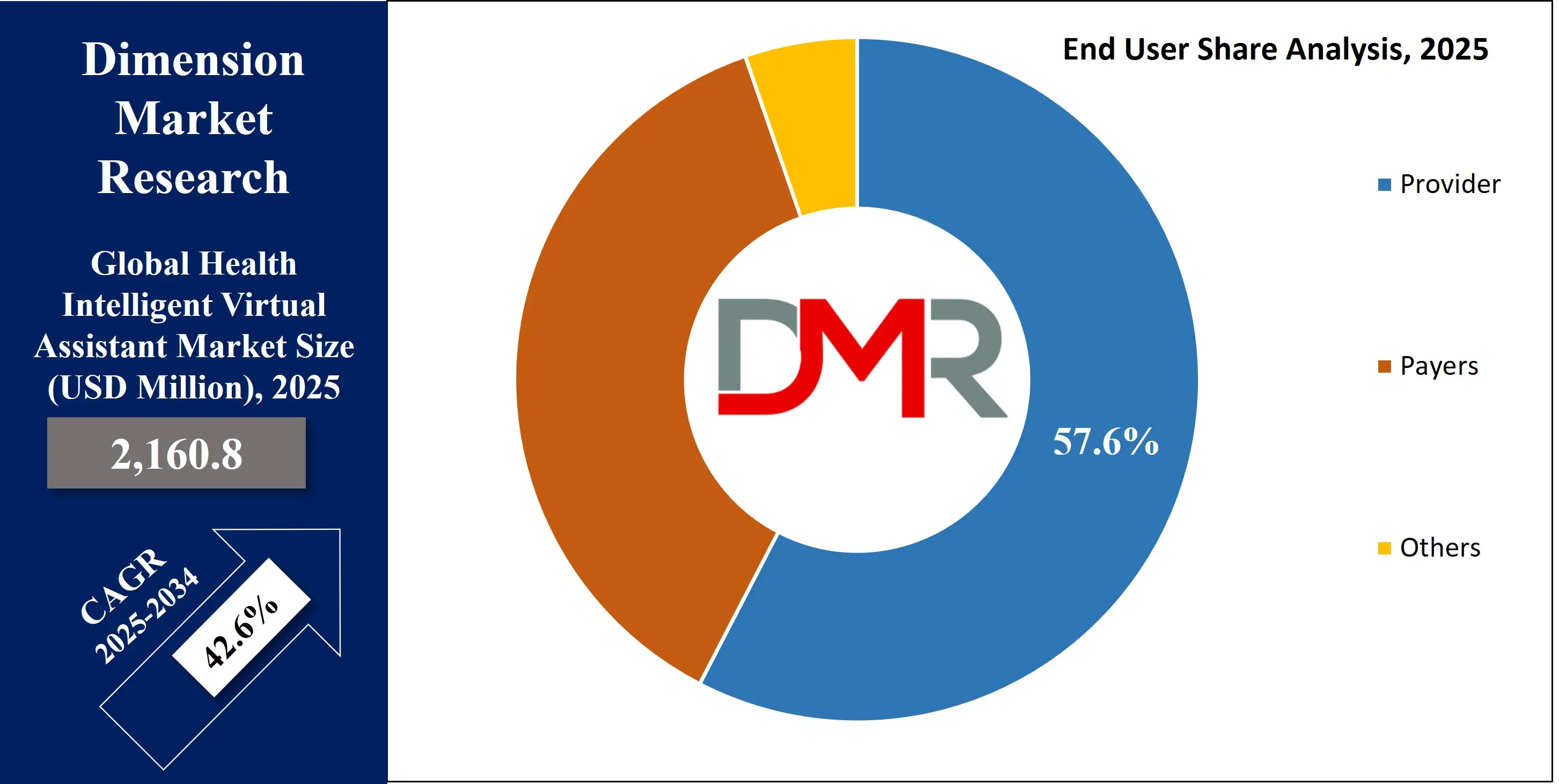
These tools assist providers in managing patient volumes efficiently while ensuring personalized care delivery. With rising demand for value-based healthcare and digital health transformation, providers are leveraging intelligent assistants to reduce wait times, improve care coordination, and increase staff productivity. The adoption of these systems is also fueled by the need to mitigate workforce shortages in the healthcare industry.
Payers, including health insurers and third-party administrators, are expected to register the highest CAGR in the Health Intelligent Virtual Assistant market by 2025. Virtual assistants are being integrated into payer platforms to manage claims processing, policyholder inquiries, pre-authorization workflows, and member engagement.
These tools enhance operational efficiency and improve the consumer experience through real-time query resolution and personalized benefits information. Rising emphasis on cost containment, along with the integration of AI in health insurance tech, is driving their adoption. As payers shift toward digitally optimized service models, intelligent virtual assistants are becoming critical in enhancing member communication and satisfaction.
The Health Intelligent Virtual Assistant Market Report is segmented on the basis of the following:
By Product
By Technology
- Automated Speech Recognition
- Text-to-Speech
- Text-based
- Others
By End User
Regional Analysis
Region with the largest Share
North America is expected to hold the largest share of the global Health Intelligent Virtual Assistant market with a revenue share of 45.2% by the end of 2025. This dominance is primarily driven by the rapid adoption of AI-powered healthcare technologies, a strong presence of leading digital health companies, and significant investment in telemedicine infrastructure.
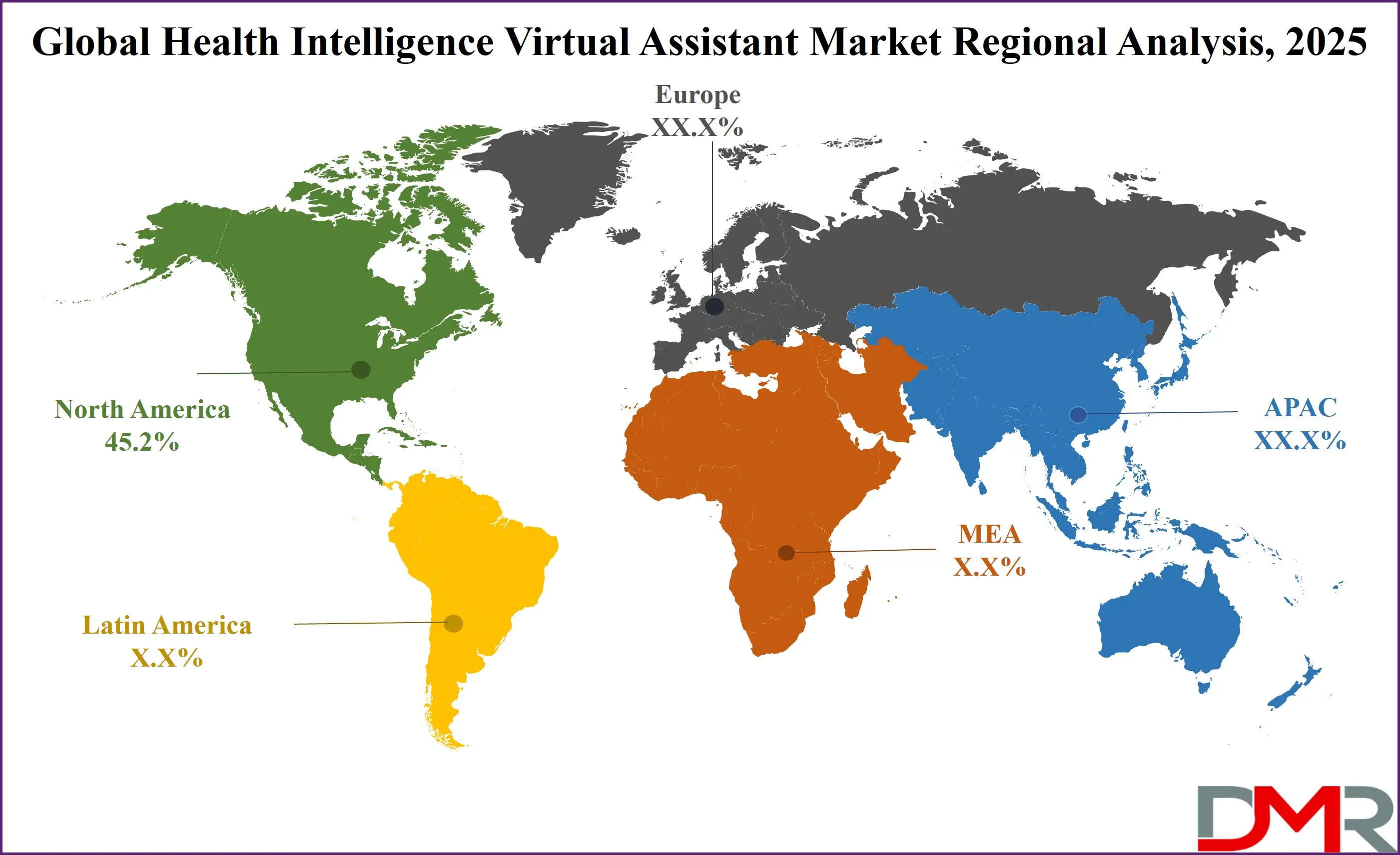
The U.S. healthcare system, in particular, is leveraging virtual assistants for streamlining administrative tasks, improving patient engagement, and enhancing clinical decision-making. Moreover, widespread use of EHR systems and increasing demand for remote patient monitoring further boost market growth in the region. Supportive government initiatives and high healthcare IT spending continue to position North America as the global leader in virtual health innovation.
Region with Highest CAGR
Asia-Pacific is projected to experience the highest CAGR in the Health Intelligent Virtual Assistant market through 2025. Rapid digitization of healthcare services, increasing smartphone penetration, and expanding internet access across emerging economies like China, India, and Southeast Asia are key growth factors.
Governments and private players are investing heavily in AI-driven healthcare platforms to bridge care gaps, particularly in rural and underserved areas. Additionally, the growing focus on affordable healthcare solutions, combined with a rising elderly population and shortage of medical professionals, is driving the deployment of intelligent virtual assistants. The region’s expanding tech ecosystem and emphasis on digital health transformation make it a hotbed for innovation and accelerated growth.
By Region
North America
Europe
- Germany
- The U.K.
- France
- Italy
- Russia
- Spain
- Benelux
- Nordic
- Rest of Europe
Asia-Pacific
- China
- Japan
- South Korea
- India
- ANZ
- ASEAN
- Rest of Asia-Pacific
Latin America
- Brazil
- Mexico
- Argentina
- Colombia
- Rest of Latin America
Middle East & Africa
- Saudi Arabia
- UAE
- South Africa
- Israel
- Egypt
- Rest of MEA
Impact of Artificial Intelligence in the Health Intelligent Virtual Assistant Market
- 24/7 Patient Engagement and Support: AI-powered virtual assistants offer round-the-clock healthcare support, answering patient queries, scheduling appointments, and sending medication reminders. These assistants enhance accessibility, reduce administrative burden, and improve patient satisfaction by delivering timely, accurate information and support, especially in telehealth and remote care settings.
- Personalized Healthcare Interactions: AI enables virtual assistants to provide personalized health guidance based on user history, symptoms, and behavior. By analyzing patient data, these systems deliver tailored recommendations, monitor chronic conditions, and adapt communication styles to suit individual preferences, fostering trust and improving adherence to treatment plans.
- Improved Clinical Workflow and Efficiency: Health intelligent virtual assistants streamline clinical workflows by automating repetitive administrative tasks like data entry, insurance verification, and follow-up reminders. This reduces the workload on healthcare staff, minimizes errors, and allows clinicians to focus more on patient care, enhancing overall operational efficiency.
- Predictive Insights and Early Diagnosis: AI-powered assistants analyze vast health datasets to detect early signs of medical issues. By identifying patterns and anomalies in real-time, these systems support preventive care and timely interventions. Their ability to triage symptoms effectively also aids in directing patients to appropriate levels of care quickly and efficiently.
Competitive Landscape
The competitive landscape of the Health Intelligent Virtual Assistant market is characterized by the presence of several key players striving to enhance their product offerings through advanced AI integration, strategic partnerships, and technological innovation. Major companies such as Nuance Communications, Microsoft Corporation, Amazon Web Services, and Infermedica are leading the charge by offering solutions tailored for clinical decision support, patient engagement, and virtual health triage.
These firms are investing heavily in natural language processing (NLP), machine learning algorithms, and speech recognition systems to improve the accuracy and responsiveness of virtual assistants in healthcare settings.
Startups and healthtech innovators are also gaining ground by focusing on specialized services such as chronic disease management, voice-enabled documentation, and symptom checkers. Collaborations between electronic health record (EHR) vendors and AI developers are accelerating the deployment of smart assistants across hospitals and ambulatory care centers.
Moreover, the surge in demand for remote healthcare services and digital front door solutions is intensifying competition and driving market expansion. With growing emphasis on operational efficiency and personalized patient experiences, companies are prioritizing scalable, secure, and interoperable platforms. The market remains dynamic, with continuous R&D and regulatory compliance shaping the trajectory of intelligent virtual assistant adoption in healthcare.
Some of the prominent players in the Global Health Intelligent Virtual Assistant Market are
- Nuance Communications
- Microsoft Corporation
- Amazon Web Services (AWS)
- Google LLC
- Sensely Inc.
- HealthTap, Inc.
- Babylon Health
- Infermedica
- Buoy Health
- Orbita Inc.
- ADA Health GmbH
- Medwhat
- Next IT Corporation
- eGain Corporation
- Kore.ai
- Gyant
- K Health
- Syllable
- Notable Health
- Cognitivescale
- Other Key Players
Recent Developments
- In May 2025, Buoy Health enhanced its assistant by adding live medical data integration, generating personalized care plans based on user profiles and locations. Trial outcomes demonstrated quicker triage and improved assessment accuracy.
- In May 2025, Google LLC embedded advanced large language model (LLM) assistants into its Cloud Healthcare APIs. This update enhances patient communication and clinical inquiry support, promoting greater interoperability and adoption by developers across healthcare systems.
- In April 2025, Infermedica unveiled ‘Ask AI’, a virtual assistant toolkit designed for providers. It incorporates symptom checkers with risk scoring and follow-up suggestions. Early European trials indicated better patient satisfaction and improved diagnostic accuracy.
- In February 2025, Babylon Health launched an AI-based care navigator integrated into its assistant, offering lab result access, appointment booking, and personalized reminders. This upgrade boosted user interaction rates compared to earlier versions.
Report Details
| Report Characteristics |
| Market Size (2025) |
USD 2,160.8 Mn |
| Forecast Value (2034) |
USD 52,735.5 Mn |
| CAGR (2025–2034) |
42.6% |
| Historical Data |
2019 – 2024 |
| The US Market Size (2025) |
USD 821.4 Mn |
| Forecast Data |
2025 – 2033 |
| Base Year |
2024 |
| Estimate Year |
2025 |
| Report Coverage |
Market Revenue Estimation, Market Dynamics, Competitive Landscape, Growth Factors, etc. |
| Segments Covered |
By Product (Chatbot, Smart Speakers), By Technology (Automated Speech Recognition, Text-to-Speech, Text-based, Others), By End User (Provider, Payers, Others) |
| Regional Coverage |
North America – US, Canada; Europe – Germany, UK, France, Russia, Spain, Italy, Benelux, Nordic, Rest of Europe; Asia-Pacific – China, Japan, South Korea, India, ANZ, ASEAN, Rest of APAC; Latin America – Brazil, Mexico, Argentina, Colombia, Rest of Latin America; Middle East & Africa – Saudi Arabia, UAE, South Africa, Turkey, Egypt, Israel, Rest of MEA |
| Prominent Players |
Nuance Communications, Microsoft Corporation, Amazon Web Services (AWS), Google LLC, Sensely Inc., HealthTap, Inc., Babylon Health, Infermedica, Buoy Health, Orbita Inc., ADA Health GmbH, Medwhat, Next IT Corporation, eGain Corporation, Kore.ai, Gyant, K Health, Syllable, Notable Health, Cognitivescale, and Other Key Players |
| Purchase Options |
We have three licenses to opt for: Single User License (Limited to 1 user), Multi-User License (Up to 5 Users), and Corporate Use License (Unlimited User) along with free report customization equivalent to 0 analyst working days, 3 analysts working days, and 5 analysts working days respectively. |
Frequently Asked Questions
The Global Health Intelligent Virtual Assistant Market size is estimated to have a value of USD 2,160.8 million in 2025 and is expected to reach USD 52,735.5 million by the end of 2034.
North America is expected to be the largest market share for the Global Health Intelligent Virtual Assistant Market with a share of about 45.2% in 2025.
Some of the major key players in the Global Health Intelligent Virtual Assistant Market are Nuance Communications, Microsoft Corporation, Amazon Web Services, and many others.
The market is growing at a CAGR of 42.6% over the forecasted period.
The US Health Intelligent Virtual Assistant Market size is estimated to have a value of USD 821.4 million in 2025 and is expected to reach USD 16,818.1 million by the end of 2034.